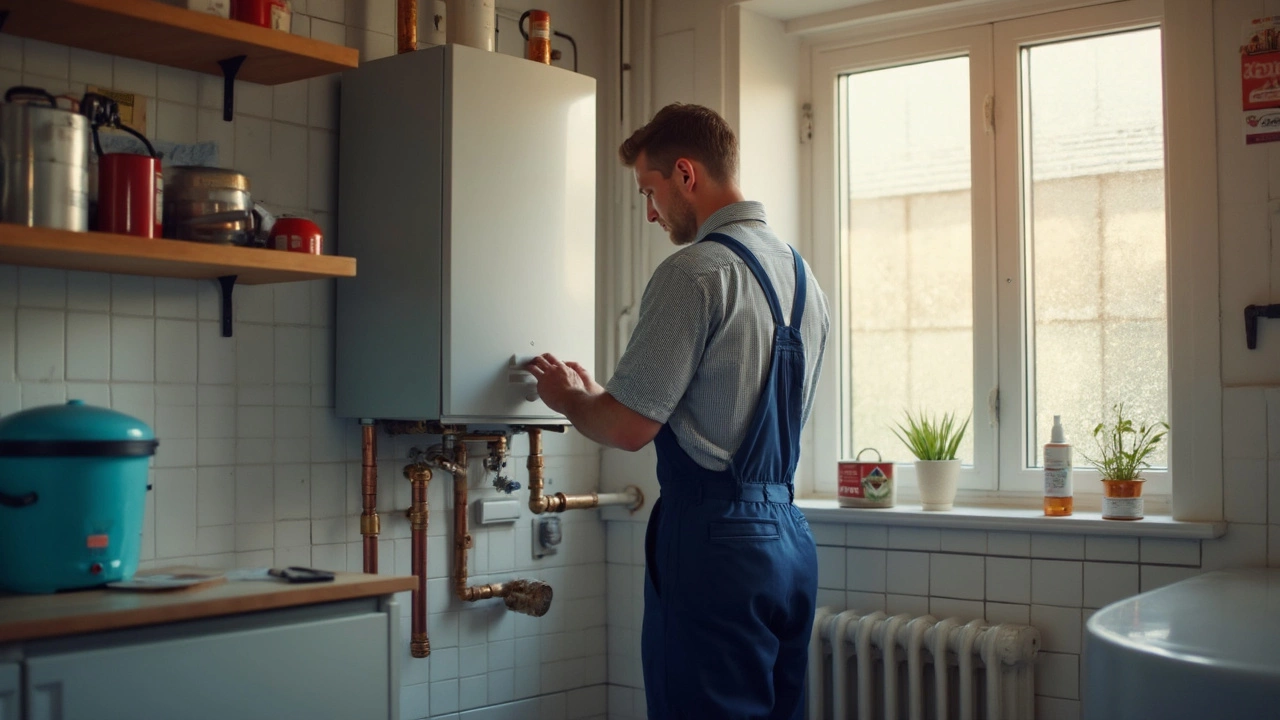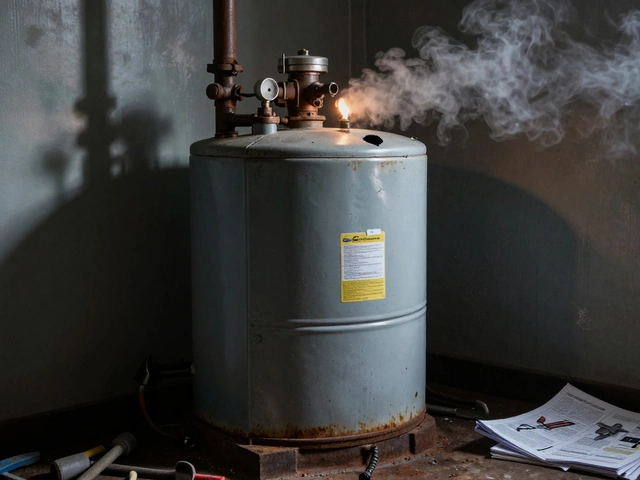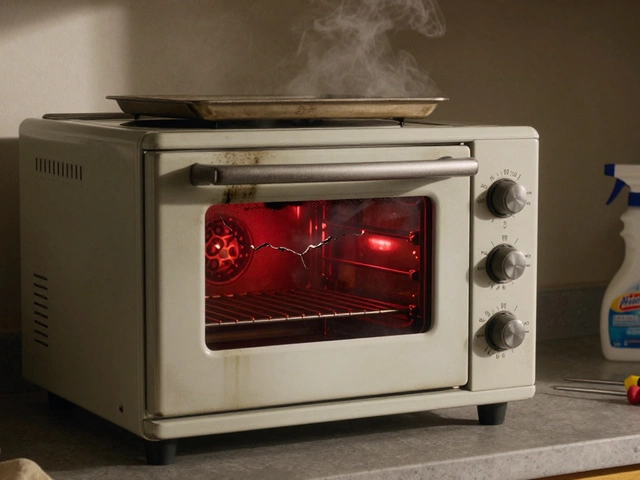Cracking open a boiler and fiddling around with the insides seems tempting when you're facing those yearly service bills. I get it—I've been there, standing in the kitchen with a toolkit and a YouTube video. The problem is, boilers aren’t like unclogging a sink or changing a lightbulb. There’s a lot more risk if something goes sideways.
Here’s the big thing: in the UK, it's actually against the law for anyone without the proper Gas Safe registration to do most kinds of work on gas boilers. You can, however, do some light maintenance to keep your system purring—like topping up pressure or giving things a basic check over. Anything that involves digging into the boiler or tweaking gas parts is strictly pro-only territory.
If you’re like me and you just want reliable hot showers without shelling out loads of money for every little hiccup, it's smart to know exactly where to draw the line. Learning what you can do yourself (and what could potentially void your warranty, or worse, put your family at risk) is a serious game changer.
- What Boiler Servicing Involves
- DIY Tasks You Can Safely Do
- Jobs That Legally Need a Pro
- Common Dangers of DIY Boiler Repair
- Tips for Staying Safe and Efficient
- When to Call a Registered Engineer
What Boiler Servicing Involves
So, what actually happens during a real boiler service? A qualified engineer isn’t just poking around with a screwdriver—they’re checking a load of stuff that keeps the system safe and efficient. There’s a proper process to follow, and skipping steps isn’t an option if you want your boiler ticking along for years.
Here’s what they do in a typical annual service:
- Visual Inspection: The engineer starts by checking the outside of the boiler and the system for leaks, corrosion, or weird noises. They also make sure the flame looks right.
- Internal Cleaning: Dust and debris aren’t just annoying—they can mess with your boiler's performance. The engineer carefully removes the cover and cleans out any gunk from inside the boiler.
- Gas Pressure and Flow Tests: This is a big one. Proper boiler repair includes making sure the gas pressure is spot on. If it’s off, your boiler might not run safely (or might not work at all).
- Flue Check: The flue is the pipe that gets rid of dangerous gases. They look for blockages and make sure everything is venting safely outside.
- Component Inspection: All the important parts—like the heat exchanger, burner, and ignition pins—get a once-over to spot signs of wear or faults.
- Safety Device Testing: They check safety devices like pressure relief valves and temperature sensors. Miss something here, and you could be looking at a serious hazard.
- Service Report: You get a written report outlining what’s been checked, cleaned, or needs fixing. Keep these for your records—you might need them for your warranty.
Most services take between 30 minutes to an hour, depending on the boiler type and any issues found. Regular boiler maintenance like this can make the big difference between a system that quietly does its job and one that breaks down right as winter hits. According to the Energy Saving Trust, a well-maintained boiler can be up to 15% more efficient than a neglected one, which adds up if your heating bill is already eye-watering.
If you’re comparing prices, here’s what folks usually pay for a boiler service in the UK:
| Type of Boiler | Average Annual Service Cost |
|---|---|
| Combi Boiler | £70 - £100 |
| System/Regular Boiler | £80 - £120 |
Paying for a proper service every year means fewer breakdowns, catches those small issues before they get pricey, and keeps things safe—no brainer, really.
DIY Tasks You Can Safely Do
There are a few boiler maintenance chores you’re totally safe to handle. These jobs don’t mess with the gas or electrical parts, so you won’t run into legal trouble—or end up Googling symptoms of carbon monoxide poisoning at 2am. If your landlord or home insurance wants proof of a professional check, though, leave the bigger stuff to the pros.
- Pressure Top-Ups: If your boiler pressure drops below that sweet spot (typically 1-1.5 bar), it's usually fine to top it up with the filling loop. Just check your manual first. Only add water until the gauge is in the green. Overfilling is as bad as running low.
- Bleeding Radiators: Cold spots or rattling? You probably have trapped air. Grab a radiator key, turn off the heating, then carefully let the air out until water dribbles. This helps your whole heating system run better.
- Visual Checks: Keep an eye out for leaks, dripping pipes, or signs of black soot around the boiler. Spotting this stuff early can save you a much bigger headache later.
- Cleaning Accessible Parts: Dust bunnies don’t belong near your boiler. Use a dry cloth to gently clean the outside and the visible vents or air intakes. Don’t poke anything inside the case.
- Resetting the Boiler: Sometimes the boiler needs a quick reset—usually, there’s a button marked for this. If your heating goes haywire, resetting might solve it, but that’s about as deep as you should go.
Take a look at how often these basic boiler service tasks usually crop up:
| Task | How Often? |
|---|---|
| Pressure Top-Up | Every 2-3 months or as needed |
| Bleed Radiators | Once or twice a year |
| Visual Check | Every month |
| Clean Exterior | Every couple of months |
| Reset Boiler | Only if needed |
Stick to this list and you won't void your warranty or end up on some "boiler fails" YouTube montage. Anything beyond this—if you need to open the boiler case or touch wiring—stop and call a boiler repair expert. Your home (and everyone in it) will thank you.
Jobs That Legally Need a Pro
Here’s the deal—when it comes to boiler service and anything involving gas, law takes over. In the UK, you legally need a Gas Safe registered engineer to work on most parts of a gas boiler. It doesn’t matter if you feel confident with a wrench; the rules are about everyone’s safety and avoiding deadly faults or leaks.
Let’s make it clear which jobs you can’t touch yourself:
- Opening the boiler case. Even if it’s just to peek inside, only a qualified pro should remove this cover because it involves safety checks and seals.
- Adjusting internal components. Tinkering with burners, heat exchangers, or pressure relief valves is totally off-limits.
- Touching gas pipework or the gas meter. Only Gas Safe engineers are allowed to check or replace anything connected to the gas supply line.
- Full annual boiler service. This check is a legal must for landlords and needed for warranty, so it has to be logged by a Gas Safe pro.
- Repairing leaks, fixing ignition, or resetting faults. Even if you spot a drip or your boiler won’t fire up, legal and insurance rules mean these are not DIY jobs.
Messing around with these jobs can land you with a hefty fine or invalid home insurance. If that’s not enough, causing a gas leak or carbon monoxide problem is life or death stuff. Quick fact: around 60 accidental deaths a year in the UK are caused by carbon monoxide poisoning—usually from dodgy or poorly serviced appliances (source: HSE).
For anything outside of basic boiler maintenance—like bleeding radiators, checking pressure, or topping up water—grab the phone and book a boiler repair expert. Spending a little upfront on a registered engineer not only keeps you on the right side of the law, but genuinely protects everyone at home.

Common Dangers of DIY Boiler Repair
Messing around with your own boiler brings serious risks, especially if you don’t have the right training. You might think it’s just a quick fix, but DIY boiler repair can actually put your home and family in danger. Here are some real problems folks run into:
- Gas leaks: Boilers run on gas, and if you don’t tighten a connection the right way, you could leave a slow leak. Gas leaks aren’t just smelly and annoying—they’re a huge fire and explosion risk.
- Carbon monoxide poisoning: If you mess up a boiler’s internal parts, it might not burn fuel properly. That can release carbon monoxide, a gas you can’t see or smell. Every year in the UK, about 60 people die from accidental carbon monoxide poisoning, mostly from faulty appliances.
- Electric shock: Boilers use electricity for pumps, timers, and circuit boards. One wrong move and you’re dealing with a live wire. It’s not worth risking a hospital trip or worse over a quick repair.
- Water damage: A simple mistake, like not tightening valves or pipes, could lead to leaks. Water can wreck floors, walls, and even cause mould you’ll battle for years.
- Voided warranty: Most boiler manufacturers require service from approved engineers. If you try to save a bit by going DIY, you could lose your warranty—meaning you pay out of pocket for repairs or a replacement.
| Risk | Potential Impact | Who Should Repair |
|---|---|---|
| Gas Leak | Explosion, fire | Registered Engineer Only |
| Carbon Monoxide | Death, serious illness | Registered Engineer Only |
| Electric Shock | Injury, electrocution | Registered Engineer Only |
| Water Damage | Home damage, mould | Potentially DIY, but risky |
| Voided Warranty | No cover for repairs | Registered Engineer Recommended |
There’s this common myth that boiler repair is just like fixing a washing machine or swapping a fuse. But boilers have strict safety laws for a reason. Even a small error can turn into a dangerous situation fast.
If you spot warning signs—like odd noises, yellow flames instead of blue, or frequent pressure drops—it’s smarter and safer to call a pro. Cheap fixes aren’t worth endangering your family, your house, or your boiler maintenance record.
Tips for Staying Safe and Efficient
If you want your boiler service to go as smoothly as possible, pay attention to the basics before you even reach for a screwdriver. Staying safe isn’t just about avoiding burns or electric shocks—it’s about not making a costly mistake that could shut down your hot water or, worse, put your home at risk.
- Always turn the power off. Before you do anything, switch your boiler off at the mains and double-check the power’s really off. This skips the kind of nasty surprise that makes you jump and teach the dog a new swear word.
- Check for gas leaks by smell. If you ever smell gas—even before you start—stop and call an engineer. Messing with gas leaks yourself is a fast track to big trouble.
- Read your boiler's manual. Seriously, don’t wing it. The manual lists which jobs are safe for you and which scream "call a pro." Most even explain how to bleed radiators or top up pressure, all without risking your safety or boiler warranty.
- Use the right tools. Grabbing the kitchen knife because you can’t find a screwdriver is a bad idea. Always use proper, insulated tools for any maintenance, and keep your hands dry to avoid slips.
- Ventilation matters. Boilers need air to work properly. Never block vents or cover the boiler cupboard with coats, towels, or the dog's bed—it could cause dangerous carbon monoxide build-up.
Here's a look at how often you should do simple boiler maintenance tasks at home. This helps you avoid small problems snowballing:
| Task | Recommended Frequency |
|---|---|
| Check boiler pressure | Once a month |
| Bleed radiators | Twice a year |
| Visual inspection for leaks | Every couple of months |
| Check pilot light (if you have one) | Every 1-2 months |
If you ever spot something unusual—a funny noise, weird smells, or leaky pipes—don’t just ignore it. Write down the symptoms, take a photo if it helps, and call a qualified boiler repair engineer. Trust me, it’s cheaper than a big fix later.
When to Call a Registered Engineer
There are times when messing with your boiler is not just risky, it's actually illegal unless you’re a Gas Safe registered engineer. If you start poking around with the parts that handle gas or combustion, you could cause a gas leak, carbon monoxide poisoning, or even an explosion. No hot shower is worth that.
So how do you know when it’s time to call a pro? Here’s a simple rule: any time your boiler repair or service involves opening the case, touching the gas line, or changing the flue (that’s the pipe that vents exhaust), you need a registered engineer. The law says only certified folks are allowed to do this. Actually, Gas Safe Register caught out over 1,000 illegal gas jobs in 2023 alone, with many leading to dangerous situations at home.
Examples of jobs you must leave to a registered engineer include:
- Annual servicing for warranty or insurance purposes
- Boiler not igniting or showing repeated fault codes
- Water leaks from inside the boiler unit
- Unexplained pressure drops or rises
- Odd smells (like gas or burning)
- Unusual noises (banging, whistling, gurgling)
If your boiler is due for its yearly check, you’ll need a Gas Safe-registered pro to keep your warranty valid. A lot of people don’t realize DIY repairs could actually void their home insurance too. And if you’re a landlord, the government says you have to get every gas appliance checked yearly by someone with the right documents—it’s not optional and can come with big fines if skipped.
Here’s a quick table to make it super clear:
| Task | DIY? | Registered Engineer Needed? |
|---|---|---|
| Repressurise the system | Yes | No |
| Relight the pilot light | Sometimes | If repeated, Yes |
| Fixing leaks inside the boiler | No | Yes |
| Annual service | No | Yes |
| Open boiler case | No | Yes |
Long story short: if you’re ever unsure or feel out of your depth, don’t gamble it. Call a pro for anything beyond basic boiler maintenance. Peace of mind and your family’s safety really are worth more than saving a few quid.





